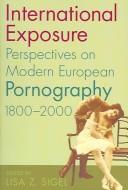| Listing 1 - 3 of 3 |
Sort by
|
Book
ISBN: 2200269234 9782200269234 Year: 2005 Publisher: Paris: Armand Colin,
Abstract | Keywords | Export | Availability | Bookmark
 Loading...
Loading...Choose an application
- Reference Manager
- EndNote
- RefWorks (Direct export to RefWorks)
La République des faibles saisit une humanité affrontée au mal et au malheur au moyen de lois de nature pénale et civile promulguées à la fin du XIXe siècle. Ces lois privilégient l'examen des passions dans l'ordre de la sexualité, du crime, de l'amour et du désamour paternel, de la séduction : passions présentées dans le droit comme celles d'une humanité éternelle et sans histoire. Pourquoi faire des lois et d'où viennent-elles quand leurs promoteurs disent en ces temps positivistes se préoccuper de la subjectivité du sujet et de sa nature intime ? Le croisement des matériaux fait apparaître les doctrines juridiques de Raymond Saleilles ou de Gabriel Tarde, les positions des philosophes catholiques comme le sénateur René Bérenger ou encore celles du libre-penseur Alfred Fouillée, Les positions de ces analystes de la société civile sont prises au tournant du siècle dans un contexte d'intenses échanges au sein de congrès internationaux où l'apport de la pensée juridique allemande apparaît capital. En fouillant les entrailles du droit républicain, les protagonistes parfois oubliés de ce chantier rendent compte d'une aspiration démocratique pour un homme doué de raison mais incapable, âme perdue ou malheureuse de la conscience républicaine dont l'histoire restait à faire
Law --- Droit --- Législation --- History --- Histoire --- Législation --- Justice, Administration of --- Administration of justice --- Courts --- Law and legislation --- Law - France - History --- Law - France - History - 19th century --- Law - France - History - 20th century --- Droit - France - Histoire --- Droit - France - Histoire - 19e siècle --- Législation - France - Histoire - 20e siècle


ISBN: 9780813541044 9780813535180 Year: 2005 Publisher: New Brunswick, N.J. Rutgers University Press
Abstract | Keywords | Export | Availability | Bookmark
 Loading...
Loading...Choose an application
- Reference Manager
- EndNote
- RefWorks (Direct export to RefWorks)


ISBN: 1283592010 9786613904461 0813541042 9780813541044 0813535182 9780813535180 0813535190 9780813535197 Year: 2005 Publisher: New Brunswick, NJ
Abstract | Keywords | Export | Availability | Bookmark
 Loading...
Loading...Choose an application
- Reference Manager
- EndNote
- RefWorks (Direct export to RefWorks)
International Exposure demonstrates the wealth of desires woven into the fabric of European history: desires about empire and nation, about self and other, about plenty and dearth. By documenting the diverse meanings of pornography, senior scholars from across disciplines show the ways that sexuality became central to the individual, to the nation, and to the transnational character of modern society. The ten essays in the volume engage a rich array of topics, including obscenity in the German states, censorship in France’s Third Republic, “she-male” internet porn, the rise of incestuous longings in England, the place of the Hungarian video revolution in the global market, and the politics of pornography in Russia. Taken together, the essays illustrate the latest approaches to content, readership, form, and delivery in modern European pornography. A substantial discussion of the broad history and state of the field complements the ten in-depth case studies that examine a wide range of sources from literature to magazines, video to the internet. By tackling the highbrow and lowdown of the pornographic form, this volume lays the groundwork for the next surge of studies in the field.
Pornography --- Literature, Immoral --- Porn --- Porno --- Sex-oriented businesses --- Erotica --- History. --- Sociology of the family. Sociology of sexuality --- anno 1800-1999 --- Europe --- Sex industry
| Listing 1 - 3 of 3 |
Sort by
|

 Search
Search Feedback
Feedback About UniCat
About UniCat  Help
Help News
News